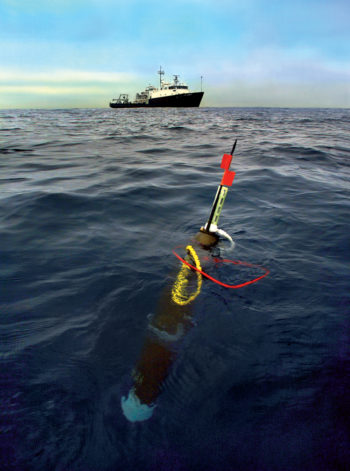The countdown has begun. In less than 24 hours, I will be boarding a ship with a team of scientists and engineers from Lawrence Berkeley National Laboratory (Berkeley Lab) and the University of California, Berkeley, as they prepare to set sail on a 10-day voyage to study the ocean’s biological carbon pump.

Berkeley Lab researchers test an earlier version of the robotic float used to measure carbon dynamics in the ocean. The R/V New Horizon is in the background. (Credit: Roy Kaltschmidt/Berkeley Lab)
Leading the 13-member team is biogeochemist Jim Bishop, a faculty senior scientist at Berkeley Lab’s Earth and Environmental Sciences Area and a professor at UC Berkeley’s Department of Earth and Planetary Science.
Bishop notes that much of the carbon dioxide in the atmosphere is sequestered in the oceans through the actions of microorganisms, but there is much about the process that remains poorly understood. The biological carbon pump operates on time scales of about a week, so detecting changes and disturbances in the cycle would require ongoing monitoring that is currently impractical and cost-prohibitive to do with humans on a ship.
Robotic floats would be ideal for such applications since they could ultimately be left out at sea for months or even a year at a much lower cost.
“No research team wants to stay out on a ship for that length of time; they’d go batty,” adds Bishop. “The robots are designed to follow the very fast process of the biological carbon pump.”
Finding better ways to measure and monitor the ocean’s biological carbon cycle would improve our understanding of how the exponential increase in atmospheric carbon dioxide is affecting this natural process, Bishop says. In turn, that knowledge could help improve climate change models.
For this trip, researchers will be deploying the latest generation of Carbon Flux Explorers, robotic technology designed and built at Berkeley Lab to autonomously measure carbon sedimentation in coastal and offshore waters at depths of up to 1,000 meters. Core engineers from Berkeley Lab are Todd Wood at the Earth Sciences Division and Tim Loew at the Engineering Division.
The project mission, funded by the National Science Foundation, is to test and calibrate these robotic floating labs. My mission is to share the experience with you.
During these expeditions, there will surely be challenges both expected and unexpected to overcome, bugs to work out in the technology, and lessons learned along the way. Such is science.
Helping me document this trip is photographer Jessica Kendall-Bar, a UC Berkeley senior in marine science and integrative biology. You can read more about Jessie on her blog.
The research vessel Oceanus sets sail from San Diego on Saturday, Aug. 13, and we invite you to follow along.
Be sure to return to this site once the voyage ends (and more bandwidth is available) for more photos — and videos — from the research effort.
